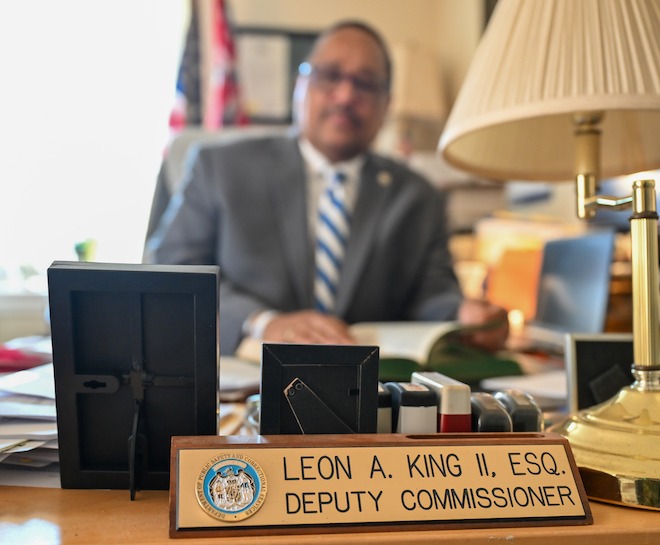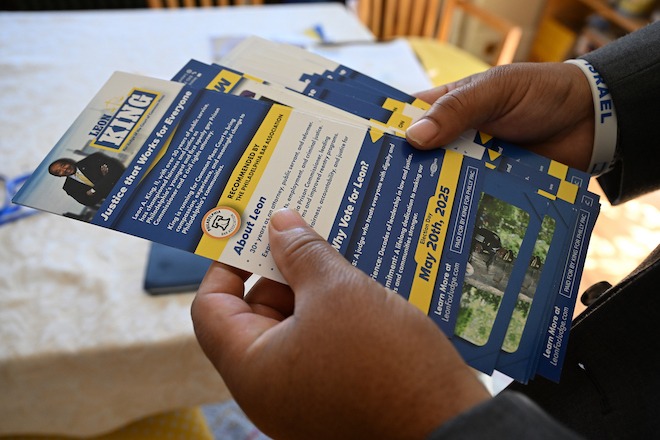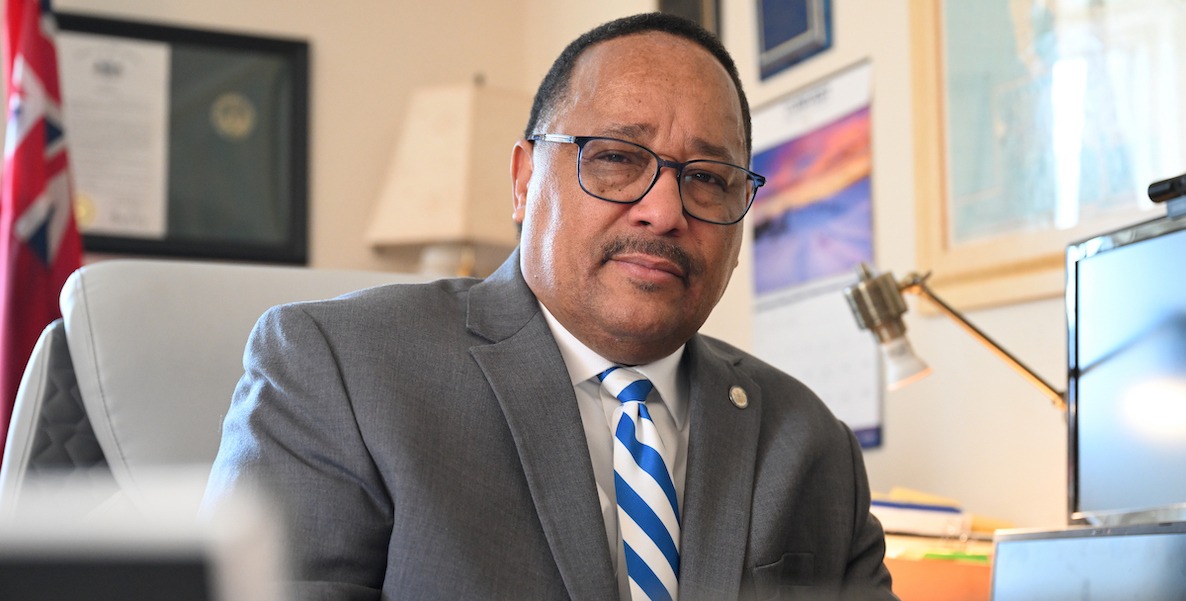Leon King II, a judicial candidate in this year’s election cycle, is an avid storyteller. As you might imagine coming from a former prisons commissioner, the characters in those stories are often colorful as well. Like the valedictorian of the jail high school who swept up ashes after a riot on State Road. (“Don’t we have anything better for this kid to do?” King recalls asking the warden.) Or the woman with dementia who stuck a gun out the doorknob of her house, only to be transferred to a long-term psychiatric facility and forgotten for eight years in another county. Or the judge who issued draconian sentences simply if you caught him in a bad mood.
With each of those stories, like many of King’s, the moral at the end is the need for empathy. Empathy came up in response to various questions — about what makes a good judge, about why he’s running, about his feelings of punishment, rehabilitation and redemption.
“People think working in the prisons can make you hard, but it also gives you wide exposure to all these people’s problems and issues,” King says, during a conversation at the headquarters of the Philadelphia Democratic Party. “If a lot of these folks would have been given what I was given, they could have accomplished what I accomplished — or something else.”
King’s not referring to a general sense of privilege or luck, but a specific outcome in his own life following a run-in with the law in 1983. After stealing a moped as a college student, King was staring down a three-year prison sentence for grand theft auto, but instead got probation. “And were it not for that judge, I might still be in [the system],” King says.
Despite that experience, King was not deterred from becoming a lawyer. After earning a law degree in 1991, he went into public service and served as a deputy city solicitor for the City of Philadelphia. In 2002, King became the first openly-LGBTQ+ prisons commissioner in Philadelphia history, a role in which he instituted programs that helped HIV-positive inmates get access to medication and expanded mental health resources. Since stepping down from that job in 2008, King has been a practicing attorney and professor of criminal justice at Drexel University, along with serving as Deputy Commissioner of the Baltimore City Jail System.
Although judicial elections tend to fly under the radar of the public interest, these are jobs with a tremendous amount of power to shape lives. The courts of common pleas are the trial courts of the Pennsylvania justice system, which rule on criminal cases, civil lawsuits, and family disputes. Judges of the 60 common pleas districts have the power to unify or split up families, impose parole or incarceration, and support or ignore diversionary programs, among other duties that influence both public safety and the prison population.
This will be King’s fifth time running for Common Pleas Court judge, although he says it’s the first that he’s had a real operation. He’s already earned a “recommended” tag from the Philadelphia Bar Association and an endorsement from the Democratic Party.

King spoke to The Citizen about his views of the bench, how to make the courts better, and why he wears tap shoes every day. This interview has been edited and condensed for clarity.
Malcolm Burnley: Judicial races are often described as “low information” contests. What’s that like as a candidate? How do you navigate the fact that —
Leon King: That no one cares?
[Laughter.]It’s both a challenge and an opportunity. It’s a challenge because the stakes are incredibly high, but many people don’t fully understand how much judges impact their daily lives — whether it’s through decisions about housing, family matters, criminal justice, or civil rights. As a candidate, it means I have to work twice as hard to educate voters about the role of the court and why having qualified, fair, and compassionate judges matters.
But it’s also an opportunity because it gives me the chance to have real conversations with people about what they care about and how the courts affect their communities. I get to share my story, my experience, and my vision for justice that gives second chances when appropriate and that works for everyone. It’s not just about winning votes — it’s about building trust and helping people understand that who sits on the bench can make all the difference. That’s why I’m committed to running a campaign that’s focused on engaging with as many people as possible and showing them that I’m ready to serve with integrity and fairness.
How do you overcome the lack of public interest?
There are people who care about judges in the city. There are ward leaders. There are committeemen. There are block captains who are very interested in the judicial race. They play a large role in educating everybody else, right? So the way that you get your information out is to introduce yourself and to get your information out to those people, who influence other people. Also, on my own, I’ve probably called 400 people.
“I come from a family of scallywags and slaves.” — Leon King
As a judicial candidate, most of us are sole practitioners. Most of us are not rich. You know, we have to beat the pavement and talk to our friends. Most of us are scrambling around [because] we don’t have money for ads. It’s unfortunate, because judges have a lot of power.
What compelled you to run for judge in the first place?
I never had a desire or a dream to be a judge. It just wasn’t something that I thought about. I had a little bit of experience [as a lawyer] with the Court of Common Pleas, but I mostly practiced in federal court. And I got to the prisons, and we had these two programs. One was the OPTIONS Program, which was an inpatient therapeutic drug treatment program. We also had the FIR (Forensic Intensive Recovery) program. And the way it was supposed to work was, [an inmate would] go to the inpatient treatment at the jail you successfully complete it, then [they] were supposed to be paroled to the inpatient FIR program, where you continue with your treatment.
So what was happening was: people would finish the OPTIONS Program, the DA and the PD would agree on a parole order, but the judges were just ignoring them. Then, they would be put back into the general population and start unlearning all the behaviors they learned in the OPTIONS unit. And then when the order finally got signed, [the inmate would have] compromised their ability to take advantage of the other programs. I didn’t understand why judges would sit on these orders. And that was when I first decided to think about running.

So the judges were keeping the prison population higher than you wanted?
Well, in a way. We had, like, 8,000 inmates generally, and like 1,200 of them were diagnosed with serious mental illnesses. I made a lot of changes with certification of the inpatient unit, changing contractors and getting somebody who had better expertise. But we decided that we should go down and give a presentation to the judges at their continuing legal education course. We gave the presentation and as a result of that presentation, we all sat down and discussed the problem and we worked it out. So we had a pilot project for Mental Health Court. We still have [the court], but that’s how it started. So the point is, these types of things were happening, and we wanted to effectuate a change.
What do you see as qualities that make a good judge?
You need an empathetic and understanding judge. You need, of course, a competent litigator who’s recommended by the bar, and you need a problem solver. I tell people, one of the things that you want to judge is problem-solving ability. So for example, aside from, like, the big problems, so you want a judge who can look at a problem, maybe one they’ve never even dealt with before, and start thinking about, what is this about? How do I understand the case?
You’ve mentioned the word empathy several times already. Tell me more about that.
I often tell people this story. When I was 19, I was arrested. I was supposed to be in school, but I got arrested [in 1983]. I’m on the eighth floor of the San Diego County jail, and the [corrections officers] said to me, “I don’t know if you should be on this block. You’re too young.” And then he said, “If anybody assaults you, don’t cry out, cause it’ll be worse for you [shhhing sound]. Just wait til the morning, and hand us a note.”
So I go in. They throw me in this four man cell. I’m on the floor, the fifth man by the toilet. So I’m scared shitless. So I called my mother in Massachusetts and said, ‘Come get me.’ My first appearance in the criminal justice system was as a defendant in California. I marched into the courtroom, and I remember how they shackled six people together. There’s my mother, and it’s, like, the most embarrassing moment of my life.
“The stakes are incredibly high, but many people don’t fully understand how much judges impact their daily lives — whether it’s through decisions about housing, family matters, criminal justice, or civil rights.” — Leon King
I pled guilty before the case started. I remember the DA was trying to keep me in prison because I could have gotten two to 10 years for stealing a motorbike. Somehow, the judge sentenced me to three years probation, and at the end of the three years, if I behaved, my conviction would be reversed and the case be dismissed. Still, I had to explain that to law school. I had to explain it when I took the Pennsylvania and Massachusetts bar [exam]. I had to explain it when I started working for the City 40 years later. That’s a story of something that happens in my life that demonstrates that I do have empathy. And were it not for that judge, I could still be sitting there, because once you get in, it’s hard to get out.
There’s a crusade in Washington against DEI. You’re a candidate who’s made up of various identities — including being a multiracial, gay, Christian and Shabbat-observing man. What do you believe those identities bring to the bench?
I come from a principled and hardworking family. I also come from a family of scallywags and slaves, a cast of men fleeing persecution and poverty. Bermuda is where they all ended up: Indian slaves from America that are in my family, African slaves from Turks and Caicos from my family. African slaves from Africa in my family. I got a German grandfather. I got Irish roots, I got Portuguese roots. But they were all criminals or running from something. My grandparents both were interracial couples in Bermuda, which had apartheid until about 1959. They were interracial couples in an apartheid thing, running around having babies. So you wonder why I am so obstinate? [laughs] Or why I started working in the prison?
That doesn’t mean that if you do something violent or bad, that I’m going to give you probation [as a judge]. But I’m going to make sure everybody has a fair opportunity to be treated with dignity in your court and to feel they’ve been heard.
Over the last few years, the incarcerated population in Philly jails has risen to dangerously high levels. As a former commissioner, what’s a solutions-oriented approach to that problem?
The jails are understaffed, and that’s the biggest problem up there. So when the jails are understaffed, they’re dangerous. When the jails are dangerous and the staff know they’re dangerous, they’re not going to do anything to unduly put themselves at risk. When I was the commissioner, we had a staffing problem, right? The administration never wants to give you money for the amount of staff that you want, so we went out and devised this “overtime monitoring system” that we thought of.
Basically, we went to the administration, and we said, if you let us hire X number of CEOs, we will reduce overtime by this amount. So they then impose this, this formula on us, and they let us hide that hire the staff. We also had a whole recruiting mechanism that I don’t think they’re doing anymore. And we hired like 300 or 400 [correctional officers] within six months.
What’s the deal with your tap shoes? Do you have them on now?
I always wear metal taps in my shoes. I’ve been doing that for 20 years. The reason I did that is you buy these cheap plastic [taps] and they wear down very quickly and then my heel starts wearing away. It protects the heel from getting all messed up. I get the metal ones, because they last forever. And I like the sound. When I am bored I like to amuse myself by trying to tap dance. It’s hard to get them now.
This is your fifth time running for judge. Is there anything you’ve learned from the past attempts?
Having a [professionally managed] campaign and people working for you that have experience running campaigns is the most important thing. Because they know all the nuances, nuances of getting everything together on a winning path that I wasn’t able to figure out before. I’ve also learned that running for judge, you don’t just walk in a room with people and expect them to support you because you have a great resume. They want to see that you have a heart and soul and that you’ve helped people, stuff like that. But the most important thing is that you need to have political leaders who are with you. I have a better operation as far as raising money this time.
 Every Voice, Every Vote funds Philadelphia media and community organizations to expand access to civic news and information. The coalition is led by The Lenfest Institute for Journalism. Lead support for Every Voice, Every Vote in 2024 and 2025 is provided by the William Penn Foundation with additional funding from The Lenfest Institute for Journalism, Comcast NBC Universal, The John S. and James L. Knight Foundation, Henry L. Kimelman Family Foundation, Judy and Peter Leone, Arctos Foundation, Wyncote Foundation, 25th Century Foundation, and Dolfinger-McMahon Foundation.
Every Voice, Every Vote funds Philadelphia media and community organizations to expand access to civic news and information. The coalition is led by The Lenfest Institute for Journalism. Lead support for Every Voice, Every Vote in 2024 and 2025 is provided by the William Penn Foundation with additional funding from The Lenfest Institute for Journalism, Comcast NBC Universal, The John S. and James L. Knight Foundation, Henry L. Kimelman Family Foundation, Judy and Peter Leone, Arctos Foundation, Wyncote Foundation, 25th Century Foundation, and Dolfinger-McMahon Foundation.
Correction: An earlier version of this story misstated which court Leon King is running to be judge of. It is Common Pleas Court.
![]() MORE ON POLITICS IN 2025 FROM THE CITIZEN
MORE ON POLITICS IN 2025 FROM THE CITIZEN
Leon King sits in his home office in Mt Airy, Philadelphia February 22, 2025 . He is running for Judge in Philadelphia



